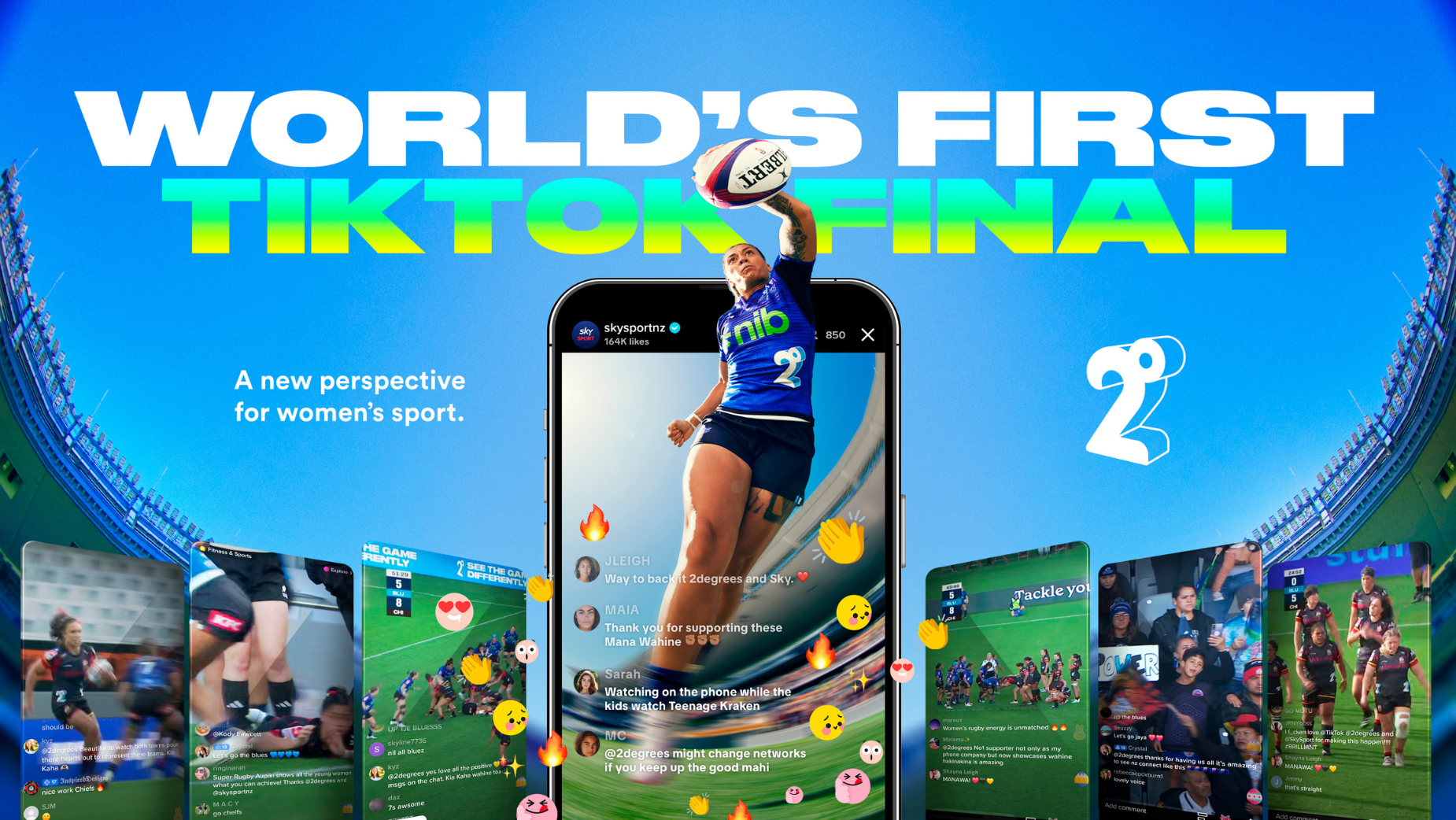
TBWA\NZ’s TikTok Women’s Rugby Tournament Drove 3% Brand Rep Lift for Telco 2degrees

TBWA\NZ and 2degrees used growing momentum around women’s sport to deliver a world-first TikTok broadcast that drove a 3% lift in brand reputation for the Kiwi telco, making it one of the country’s top 20 most respected companies.
In a world first partnership spearheaded by TBWA\NZ, New Zealand’s Aupiki women’s rugby tournament was broadcast live and for free on TikTok for a new audience – not simply streamed from the existing broadcaster. Complete with its own presenters and commentary team, the broadcast resulted in 18,200 tuning in via TikTok, which was more than 9x the stadium audience.
Overall, 92,870 people watched the final (a 34% lift on 2023). The project saw 186,000 broadcast engagements, and 60 earned media stories reaching 33 million people, including 25 national TV segments.
The brand had already been backing men’s rugby through Super Rugby Pacific and, later, extended its support to the women’s Aupiki tournament. That support became even more important when the tournament’s future became uncertain.
“The actual tournament itself was at risk of being canceled just because it didn't have that support,” TBWA\NZ CCO Shane Bradnick told LBB.
Despite the Black Ferns holding more World Cup titles than the All Blacks, women’s rugby in New Zealand still sees limited coverage and modest crowds compared to their male counterparts.
“The women rugby players here are amazing. They are electrifying, entertaining, they just haven't had as much coverage either through the media, or attendance is sometimes quite low. There felt like there was an opportunity where we could get a bit more visibility for the women's game, the women's players, and the tournament.”
As a long-time challenger brand in the telco category, Shane said 2degrees has built its platform around "fighting for fair". That brand promise informed its approach to sponsorship of the tournament.
“Sponsorship is normally there to leverage scale and to get your brand visible and to be seen as a major player. But when you have that platform of fighting for fair, it allows you to take on bigger things,” he said.
Rather than pursuing a traditional broadcast model, the team focused on reaching younger, mostly women who are less likely to watch sports on linear TV.
“It's not really a ‘sit on the couch in front of the TV’ kind of experience, but a lot of younger people are engaged with these players on social platforms,” said Shane.
“A lot of female athletes have quite strong followings on social media platforms, they are more engaging as characters and as players, and they're far more open. They have that connected audience. So that's where it sort of started.”
Conversations with TikTok started early, but Shane said the real coordination came in making sure all the brands that needed to be involved in the project were aligned.
“You had to get the brand – 2degrees were on board. We had to get Sky, the broadcasting partner, which was an undertaking for them as well, because rugby and the Aupiki tournament is on their platform behind a paywall, so they were giving up a little bit of that control. And then you had the Rugby New Zealand Rugby board as well who had held the rights, so you had to bring them on board. Eventually TikTok, as well.”
Rather than simply rebroadcasting or streaming the match on TikTok, the team created a TikTok-first experience with custom production tailored for the platform.
“It would have been possible just patch that through to TikTok, which means you would have just been watching it on your phone, and potentially cropped. What we really wanted was a bespoke TikTok specific streaming experience. That meant setting up a whole separate production crew, from cameramen to announcers to commentators.
“So we had past players, present players, people who weren't playing in the game themselves amongst the crowd, doing interviews, doing live polls, and actually taking everything that people are familiar with on TikTok and incorporating it into a broadcast.”
With women’s sport still making the most of the momentum behind it, Shane said despite the campaign’s success it’s important to avoid making women’s teams “seem like a charity case – something worth saving in a way,” Shane added.
“We wanted to be very careful that even though there was a challenge in terms of coverage and the viewership, it wasn't a case that women's sport needed to be seen as a charity. We wanted to actually create something that has the energy, the scale, and the positivity it deserves.”















